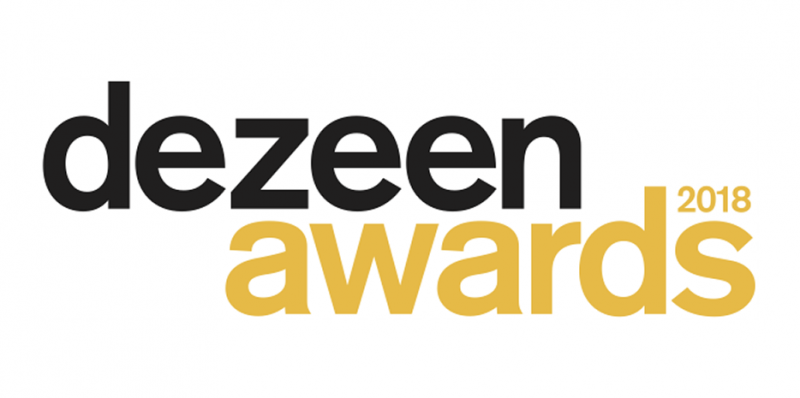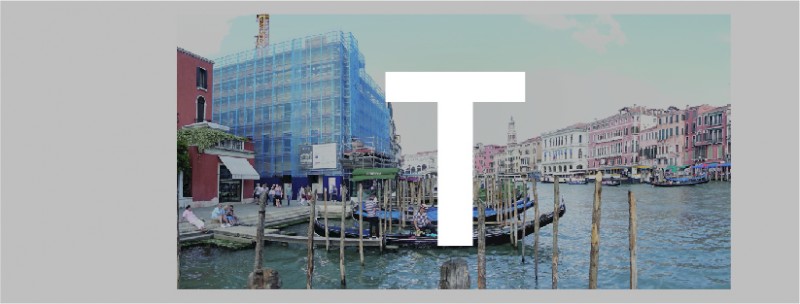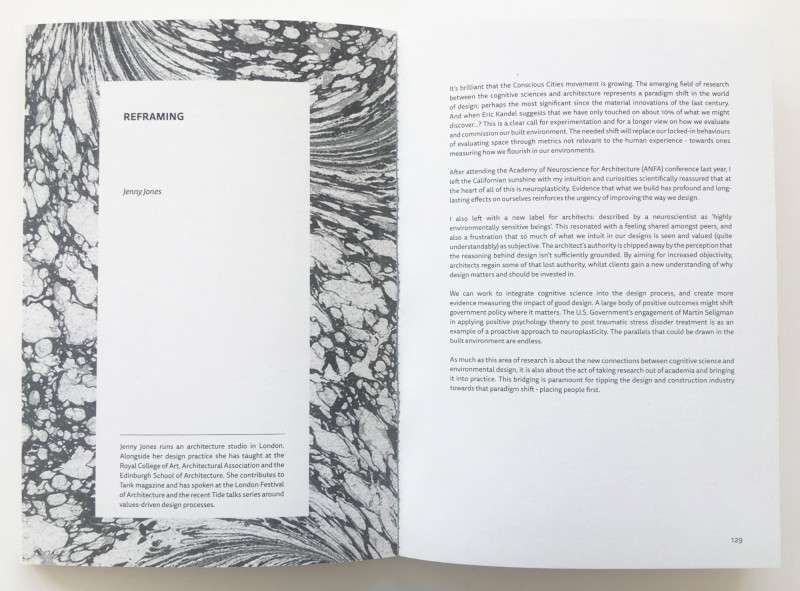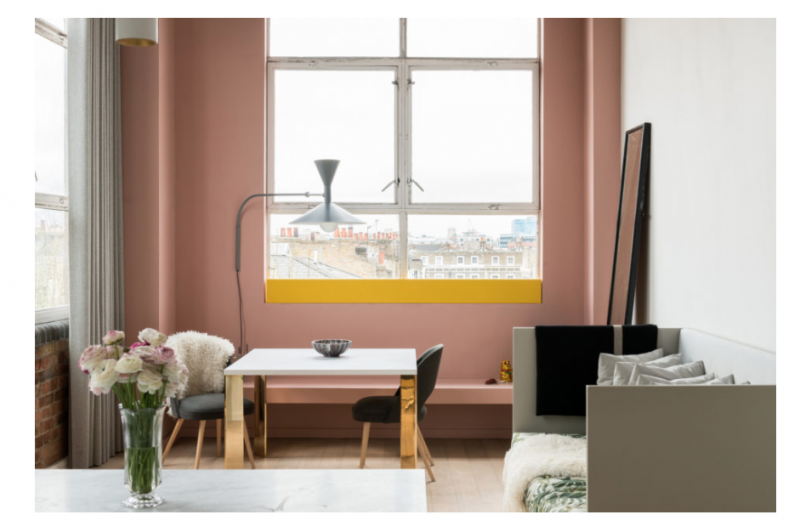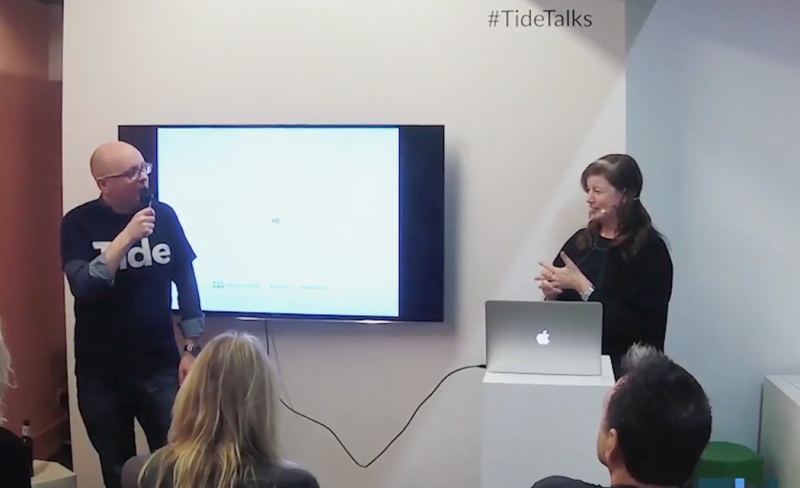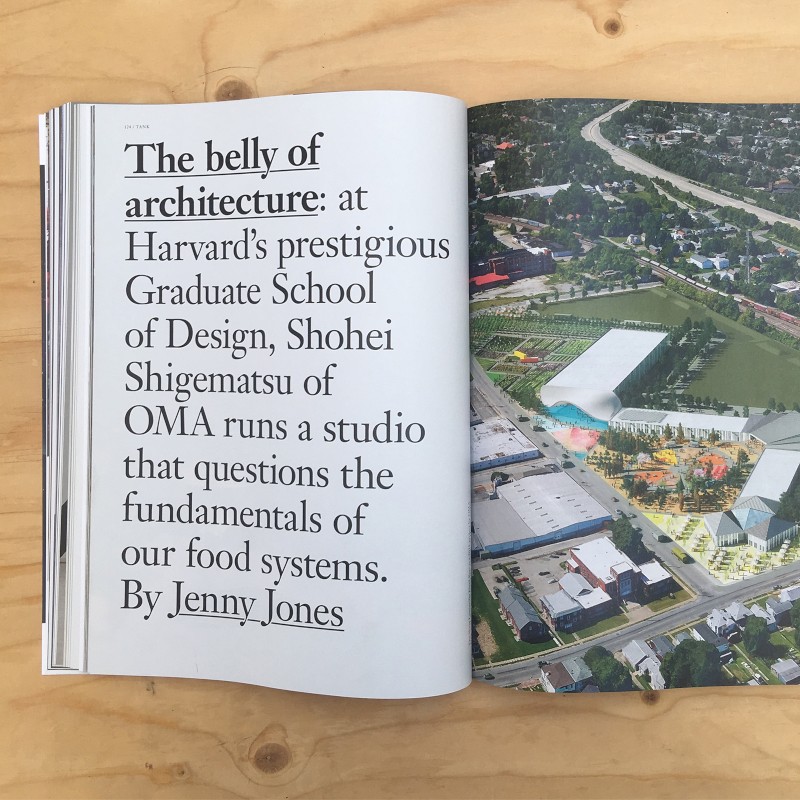STUDIO JENNY JONES
62 BRITTON STREET
LONDON EC1M 5UY
HELLO@STUDIOJENNYJONES.COM
T+44 207 253 2034
INSTAGRAM; STUDIOJENNYJONES
TWITTER: @JJ_archi
LINKED-IN: JENNY JONES
VIMEO: STUDIO JENNY JONES
TUMBLR: STUDIO JENNY JONES
PRESS ENQUIRIES: PRESS@STUDIOJENNYJONES.COM
WORK HERE: no vacancies at present
Royal Institute of British Architects Chartered Practice
STUDIO JENNY JONES
Design Strategy, Architecture and the Space Between
Studio Jenny Jones | Frank Cohen | Nicolai Frahm | Paul Raeside | Yoshitomo Nara | Film by Andrew Telling
The Dairy Art Centre
How to repurpose a disused industrial shed into an international art venue
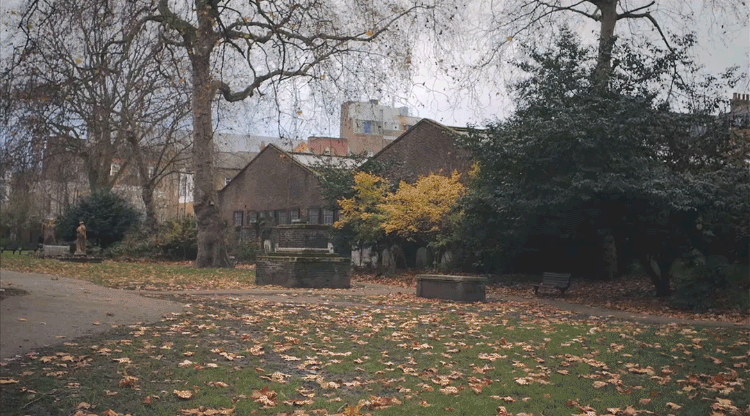
Architects | STUDIO JENNY JONES | Structure MILK | Contract Administration VERTICE | Approved Inspectors MLM
No.5 III
Loft refurbishment - how to enhance the existing
Studio Jenny Jones | Fjord | Accenture Interactive | Studio Roco
FJORD LONDON
How to create a space to inspire innovation for a company culture
Studio Jenny Jones | Leon Kacinari
Talking about transformation
Sui Generis | Artist Residencies in the City | A new economy
Studio Jenny Jones | GAA Foundation | European Cultural Centre
REFLECTING ON THE SPACE BETWEEN
PALAZZO BEMBO | VENICE BIENNALE 2018
Royal College of Art | Visiting Lecturer | Platform
Interior Futures
MA Interiors Programme, Department of Architecture
Studio Jenny Jones _ Arup
Arup Atrium Installation
Dynamic connectivity: a kinetic installation of light and reflections. How to connection between floors?
Studio Jenny Jones | Paul Raeside | Nocturne Workshop
Forever Table
How to create a junction between top and leg that seems a bit like magic
Studio Jenny Jones | Open house | Dairy Arts Centre
Contextual Research
Cultural Nolli, Mapping of WC1 showing cultural space as public realm
Open City Education Program
SJJ x ACCELERATE! 2024
Accelerate is one of the Open City’s free educational outreach programmes designed to support teenagers from under-represented backgrounds to explore what it means to study and work in the built environment.
Journal
20/06/19
Talk | Danish Embassy, London | Room for Happiness | Liveable Cities Conference 2019
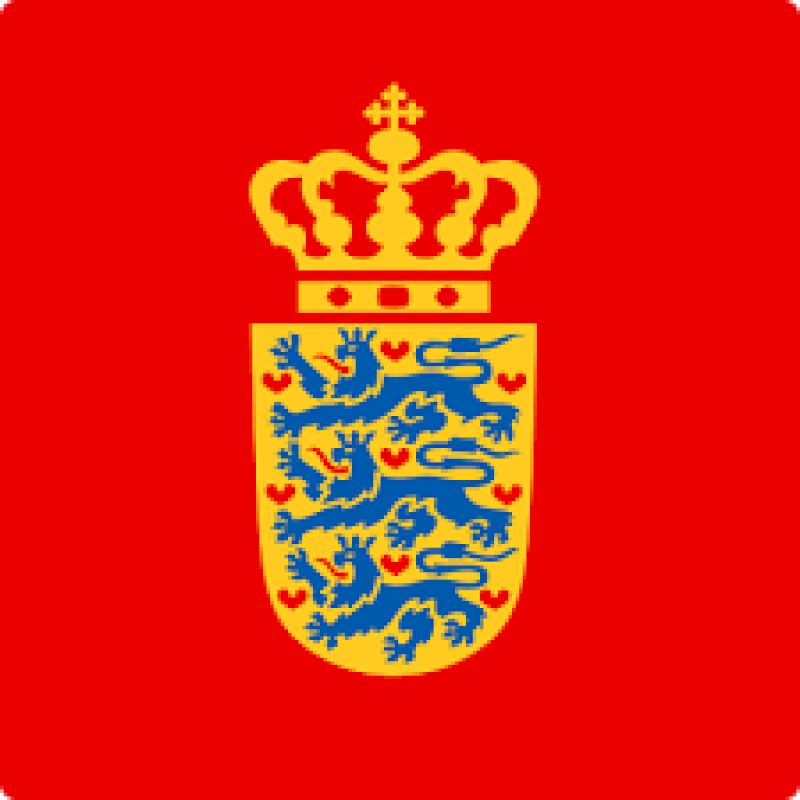
We know that great workspaces enable great productivity, but in the excitement of designing, developing and delivering these places we must never forget the people who work in them. In this seminar, best practices from both Denmark and UK will be presented, and new approaches to workspace will be discussed.
Chair:
Paul Patenall, Senior Vice President, British Council for Offices
Speakers:
Marie Hesseldahl Larsen, Partner, 3XN
Jenny Jones, Partner, Studio Jenny Jones
Emma Cariaga, Head of Operations, Canada Water British Land
Alex Marsh, Principal Project Officer, GLA
Uffe Gebauer Thomsen, Deputy Director, University of Copenhagen
David Kaiser, Head of Real Estate, WeWork
<more>
23/05/19
Clerkenwell Design Week | Wellbeing in the Workplace
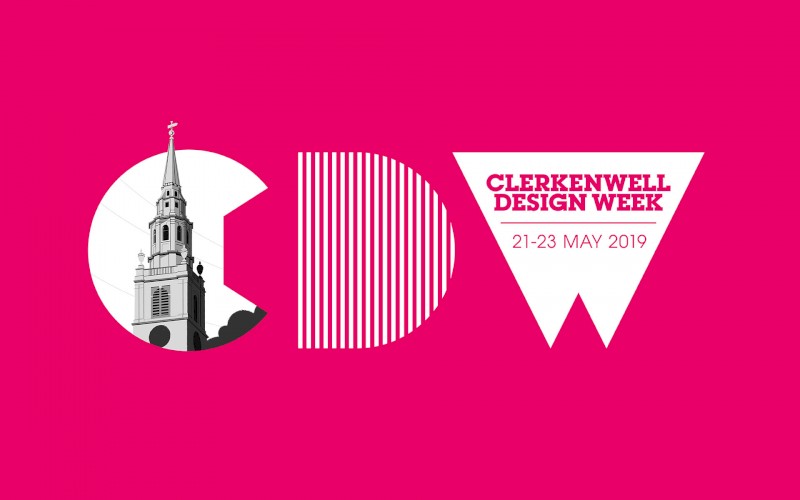
Chair: Jessica-Christin Hametner
Speakers: Jenny Jones | Aki Soudunsaari | Neil Tomkinson
OnOffice Editor meets with brands and designers, for whom ‘Wellness is the Workspace’ is a focus, whether across business strategy, design or products devised specifically to enhance our wellbeing as we work.
<more>
21/05/19
Clerkenwell Design Week | Eporta and WGSN Trends 2019
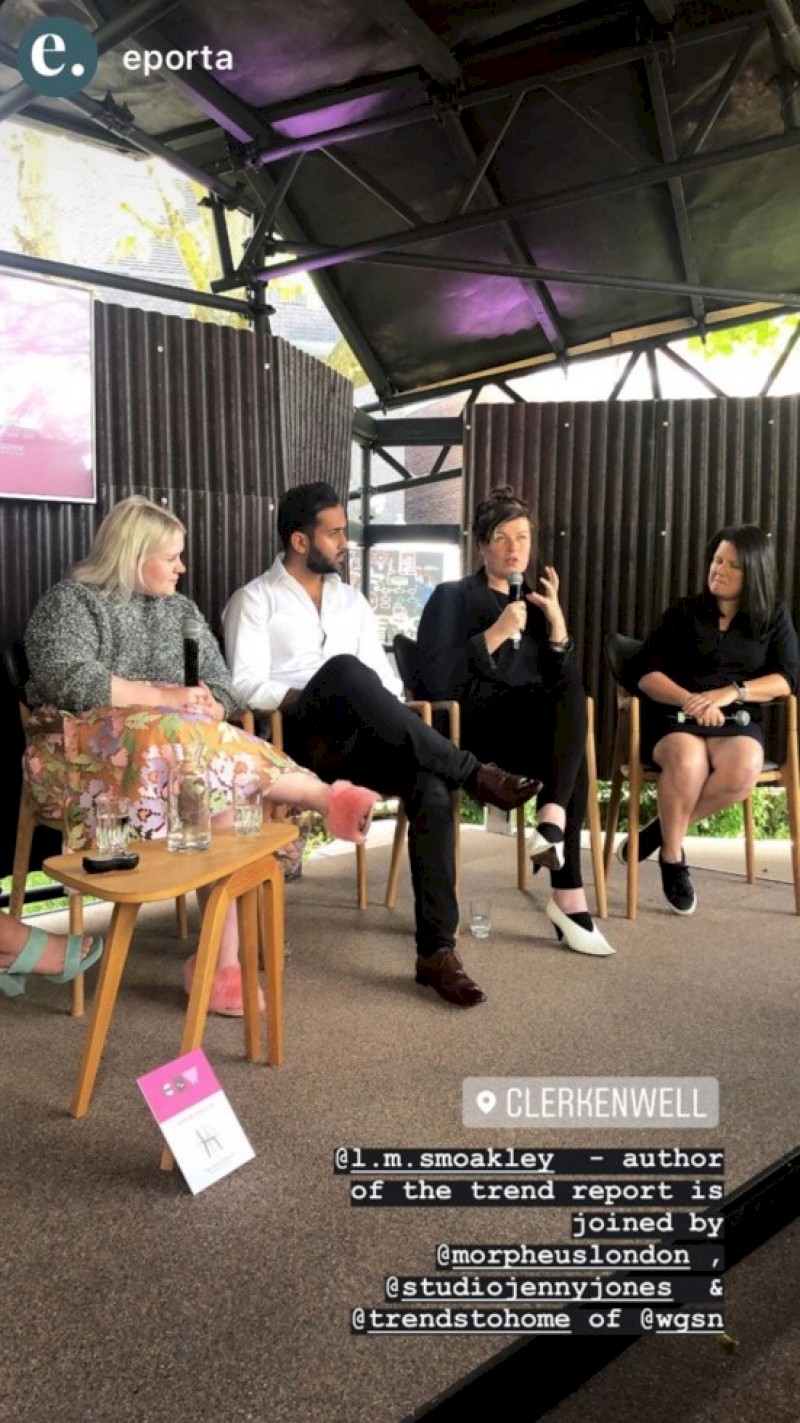
What will the future bring? Talking about data patterns and sensory and cultural zeitgeist to create your own basis for approach is super fascinating. See Eporta / WGSN Trends 2019 - click through
<more>
20/05/19
Dip 12 Final Jury | Architectural Association | Tutors Manijeh Varnese and Inigo Mins
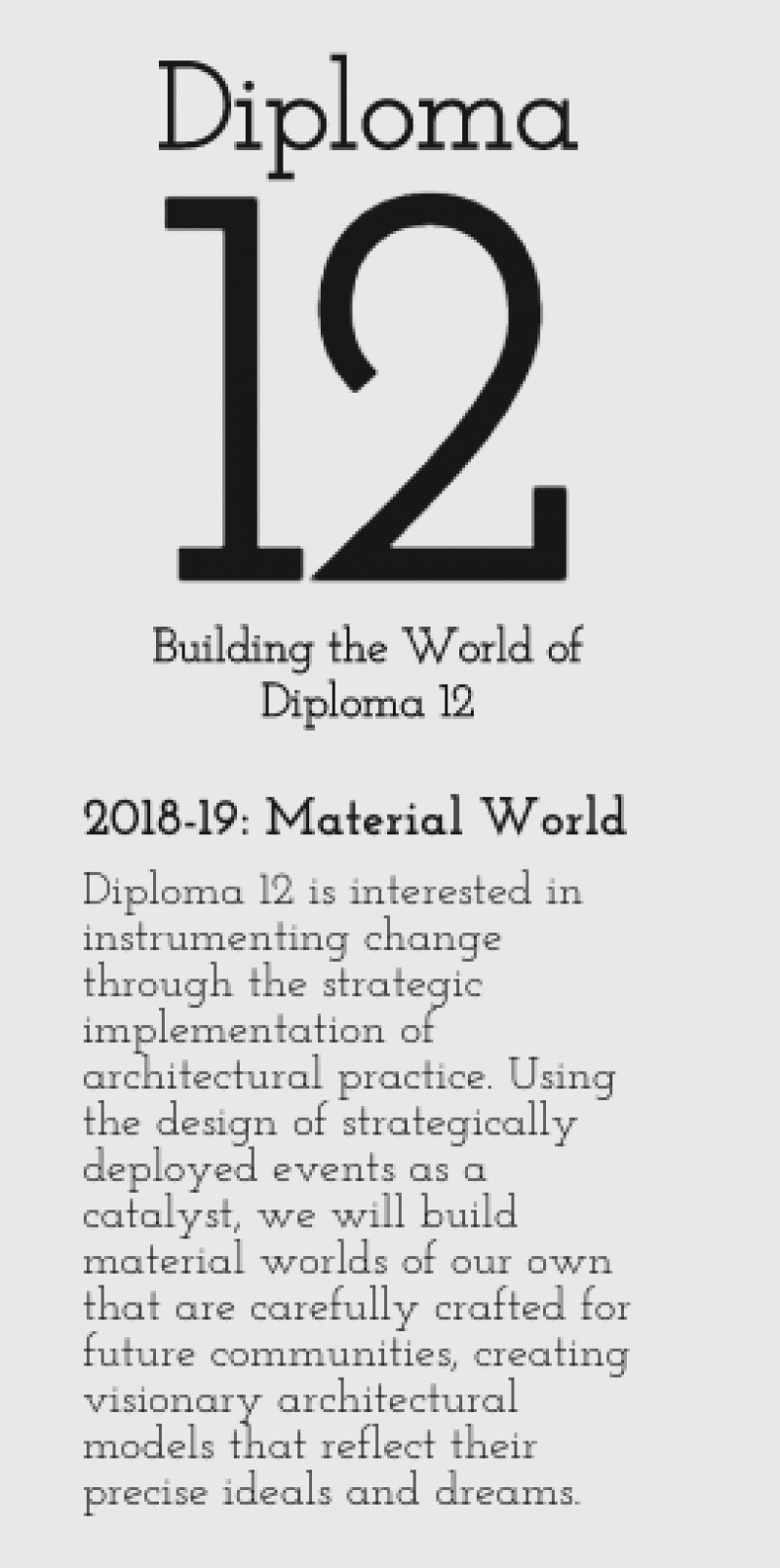
JJ - Awesome morning fantastically lost in the Material Worlds created by the Dip 12ers.
<more>
02/05/19
Rough Paper Salon No.1 | Dr Gian Luca Amadei & David Philips | Cremation Stories
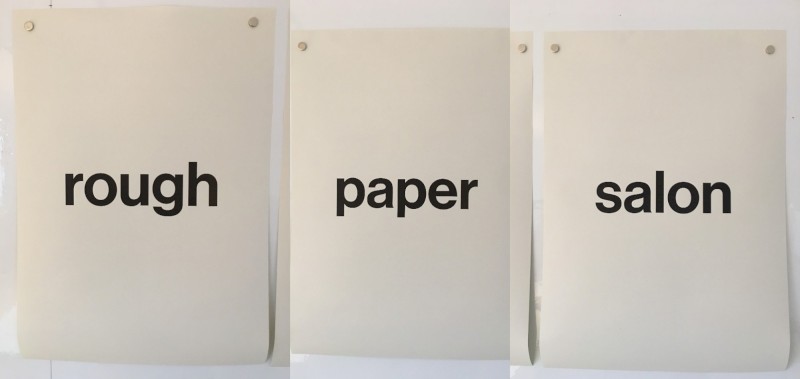
The Rough Paper Salon provides an opportunity for practitioners and academics from the arts and the built environment to come together and share work-in-progress projects, research and ideas. Co-founded by Dr Gian Luca Amadei and Jenny Jones to create a format that allows relational feedback in a non-transactional environment.
<more>
01/01/19
OnOffice's Power List Top 50 | The movers and shakers that have influenced the workspace over the last 12 months
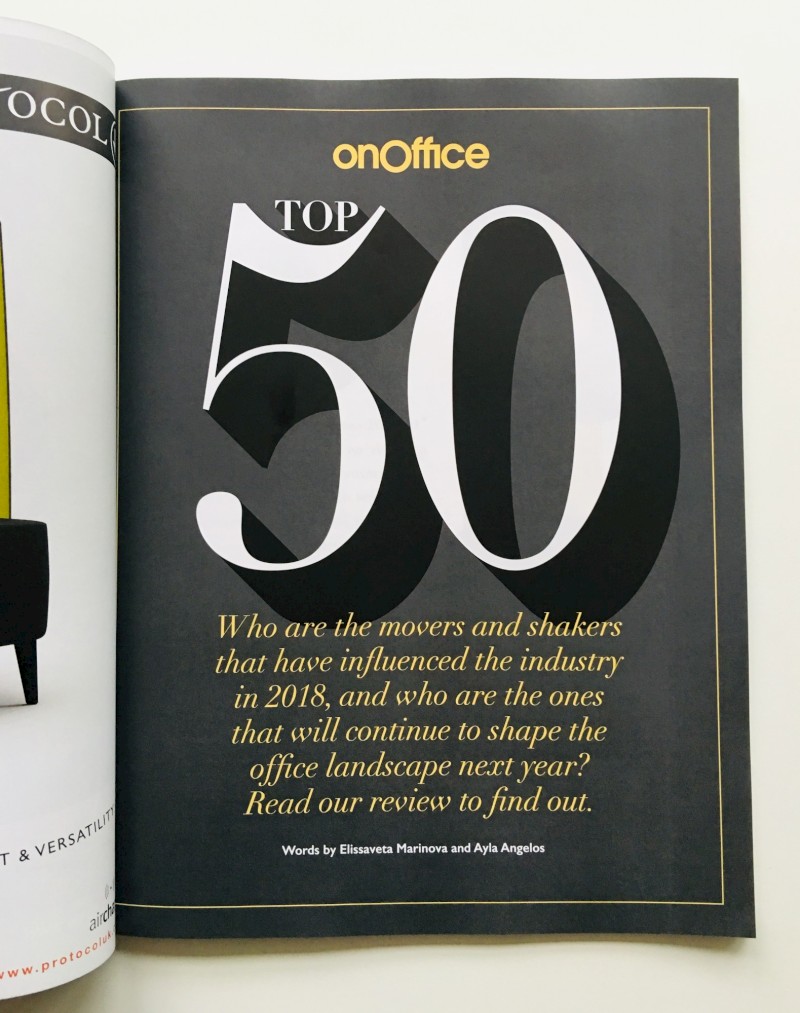
List lines up the movers and shakers that have influenced the workpace over the last 12 months
<more>
08/11/18
SPACECRAFT podcast | Dan Moscrop and Jenny Jones
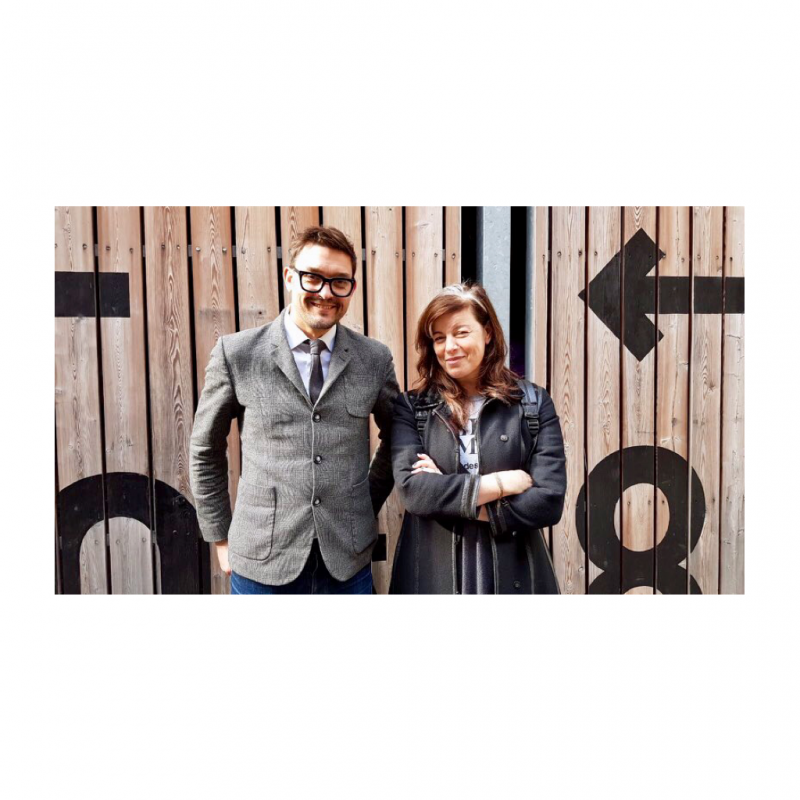
This week's podcast is with the incredible Jenny Jones — we were introduced to Jenny Jones by Payal Wadhwa from Fjord Interactive Studio. Fjord's new studio (pictured below) was designed to become an extension of their team. “Fjord’s studio space is as much a part of the culture as are the people and it makes a massive difference to how we live and work. And it continues to be absolutely lovely to work in!” Payal Wadhwa Jenny is incredibly passionate about hashtag#design and hashtag#architecture and has come from a hashtag#brand focused background, working on a number of ground-breaking retail spaces for the likes of Richard Rogers (now Rogers Stirk Harbour + Partners) and OMA. We talk about how collaboration is crucial on every project. How she used physical 'thresholds' within her work on Fjords offices. Her reaffirmation in hashtag#placemaking and design when she attended a conference at the Salk Institute for Biological Studies. A wonderfully inventive use of a Canaletto and a mirror to create interactivity in one of her exhibitions.
<more>
11/09/18
Thank you! | The Gentlewoman Issue no.18 | incredibly proud for a column inch in our favourite magazine
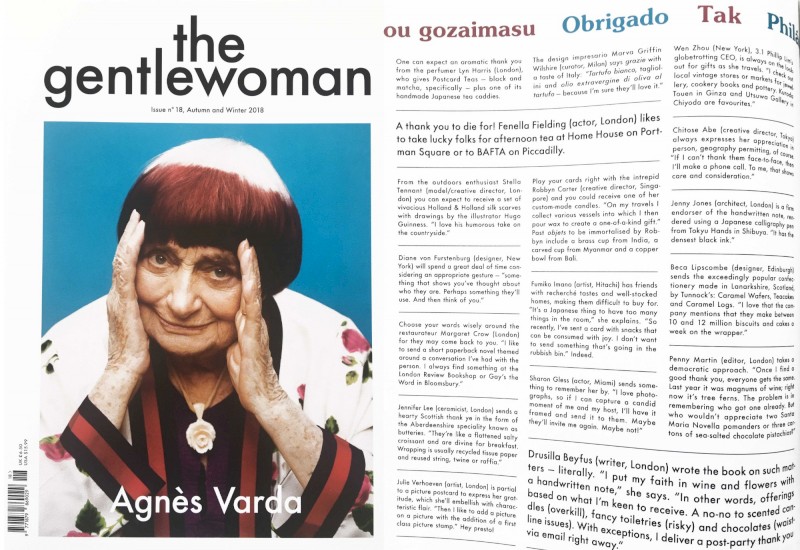
<more>
23/07/18
Onoffice Magazine | Fjord London's office breaks the open plan cliché | Claire Dowdy
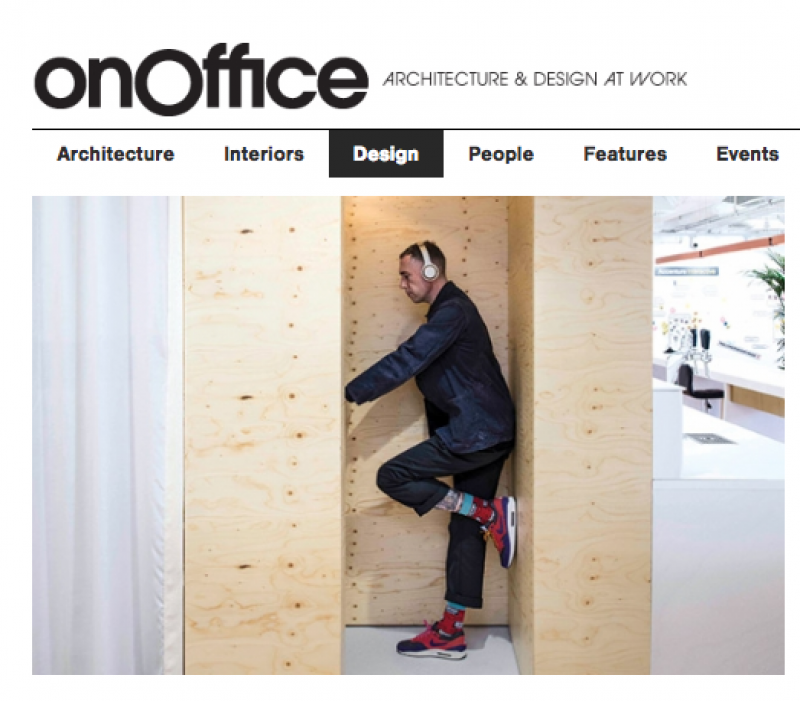
<more>
26/06/18
Designing a creative office that works with Jenny Jones for Fjord | Eporta | Bea Addis
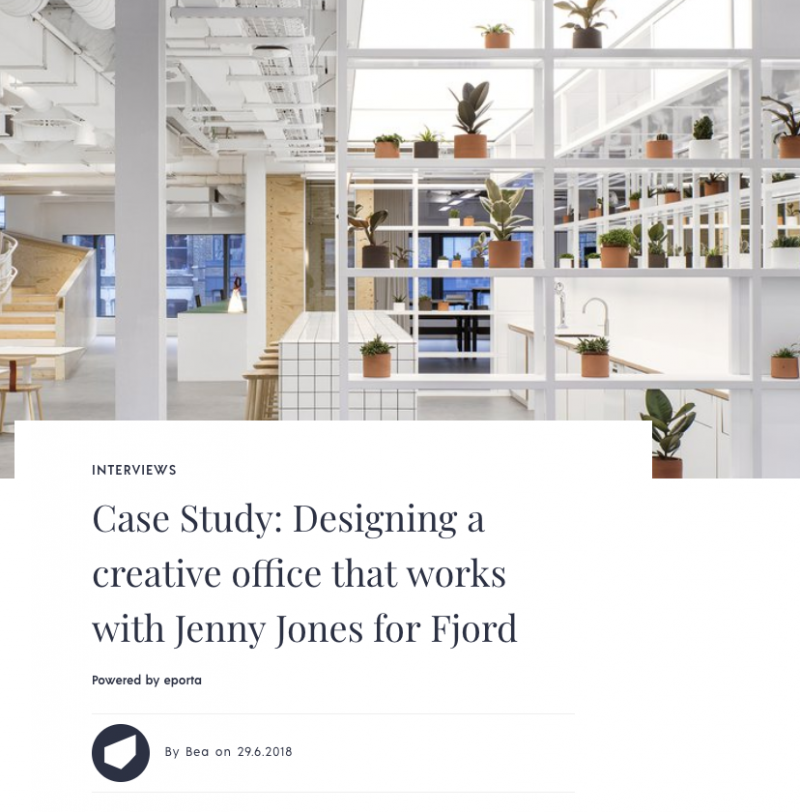
By Bea on 29.6.2018
When companies are acquired, they risk losing some of the cultural qualities that made them so special in the first place. Not in the case of Fjord, the London-based global service design consultancy, who were bought by Accenture in 2013 and moved into a new office in 2017.
Studio Jenny Jones, partnering with eporta Procurement, spent just over a year meticulously designing a bright, warm and functional office that brings Fjord’s unique ethos to life. From the big picture concept to the smallest details, this workspace is fully optimised to give creative thinkers the space they need to to flourish.
Where theatre meets neuroscience
Jenny’s eclectic portfolio includes both vast architectural developments and art centers, but it’s her time spent in a Stanislavski theatre group in her teens that defines her approach, which involves developing a constant dialogue with the client.
Her process involves creating “scripts” based on the projected use of the space: imagining how the space will be used, how objects will be used, and what the performance is. As she explains, “I can’t disassociate the performance of what is going to happen in the space from what the space will be”.
“The built environment has a clear effect on us, and yet quite often design is still seen as a superficial add-on.”
Also informed by her theatrical past is her passion for collaboration, which helps her to execute on vast projects in seemingly impossible timescales. “In theatre, you have to respect everyone, from the lighting operator to the audience, in order to pull everything together”. Luckily, this is a value that eporta Procurement shares! From respecifying to installation, we worked as a natural extension of Jenny’s team to bring her design to life as swiftly, accurately and affordably as possible.
One of Jenny’s other recent collaborators is The Centric Lab, who are dedicated to researching the links between cognitive science and architecture. “The built environment has a clear effect on us, and yet quite often design is still seen as a superficial add-on”, she explains, “but we are neuroplastic, and there’s lots of evidence to suggest that the environment affects the way your brain is structured.”
Designing for culture
Jenny’s initial relationship with Fjord was sparked by a breakfast talk that she gave on her user-centric design process, which resonated on both sides.
The initial project challenges included uncovering the sweet spots between function and design within the constraints of workplace regulations (both internal and external), and creating third spaces - break out areas and meeting rooms - that were fit for purpose.
Jenny knew that the key to sourcing was the provenance of the furniture itself, representative of the British and Scandinavian geographical roots of the company, and, like Fjord’s own work, had qualities of the supernormal: where the mechanics of the design itself are so intentional and minimal that it almost becomes invisible. This belief was shared by eporta, working hard to deliver products that fulfilled the brief, from suppliers such as Nikari. Because of this close attention to detail, staff and visitors alike are immersed in the company’s values from the moment they enter the office.
From the early stages of the design, Jenny made sure to build in elements of “storytelling with objects”: features with colloquial working titles that helped the space feel like home from day one. From the “golden drawer” where keys and other important bits are stored, to the distinctive “yellow table”. These features immediately served as a navigation tool, and helped to instill a cultural identity for the office from day one.
A space where work flows
One of the first questions Jenny asks is “In their existing situation, what stopped and allowed their work to flow?”. A detailed research process including trips to other Fjord offices helped to create the diagrams and sketches that formed the basis of the design brief.
“You listen to what’s missing in their day to day actions and think of what surfaces, spaces, objects would facilitate that”, from soundproof rooms, to writable walls that everyone can gather around.
As Jenny points out, in designing any room, “You’re setting up a scenario that means that from the moment you enter a space, the orientation, circulation and light mean you intrinsically know where to go next; an environment where people can flow, both in terms of productivity and enjoyment.”
Building walls for creativity
Jenny is leading the charge against an open-plan world. She’s observed that rather than building teams, the constant interruption that comes with this setup simply serves to build resentment. This doesn’t involve a return to cubicles, but rather the incorporation of visual or acoustic, permeable and impermeable thresholds, depending on the requirements of the space.
At Fjord, she went one step further with the addition of some flexible areas and furnishings to allow the team to create their own environment, like a stage set, with moving sofas, tables and chairs (and a massive storeroom!). We have seen the importance of flexibility growing within the workspace as discussed in our recent Trend Report.
An office that feels like home
After all this hard work, for Jenny “it doesn’t mean anything until they’re using it”. Success is when someone says that a space “feels like home”, in that it’s personal, comfortable, and authentic.“It comes back to specificity: it was designed for them,” she adds.
She’s been back to visit, and was struck by the effectiveness of small, invisible details: a door that can be opened with one hand while holding a laptop, or a staircase wide enough to hold a conversation and not block the flow of traffic. After a year of user-centric design in action, “it just works”.
Brought to life by eporta Procurement
There’s nothing the eporta team loves more than bringing innovative, unique spaces to life, so we were thrilled to support Jenny’s vision for Fjord. Whatever you’re working on, get in touch today to find out how we can support you through every stage of your project.
<more>
25/05/18
Venice Biennale is open! | Our rear view installation at Palazzo Bembo right beside the Rialto
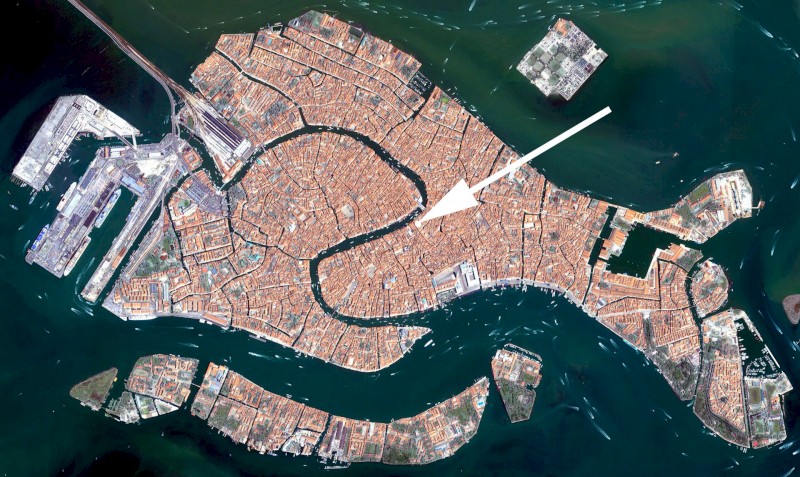
Venice Biennale
<more>
14/05/18
D & AD | Judging the New Blood Awards
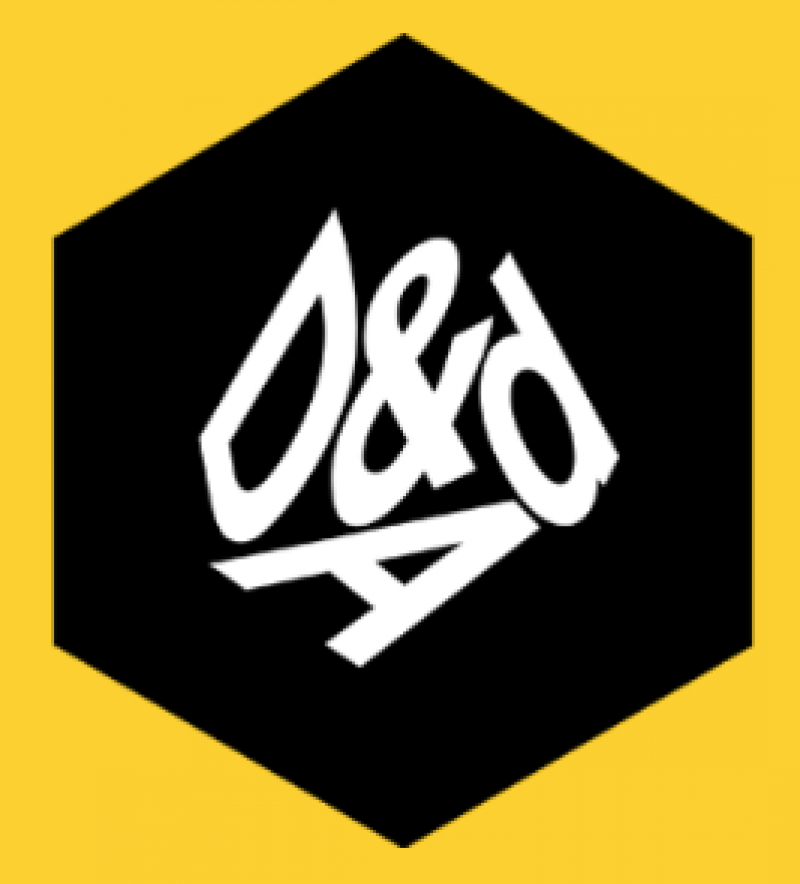
Very inspiring Day - the energy in the work was great....
<more>
06/03/18
Lecture | Royal College of Art, London
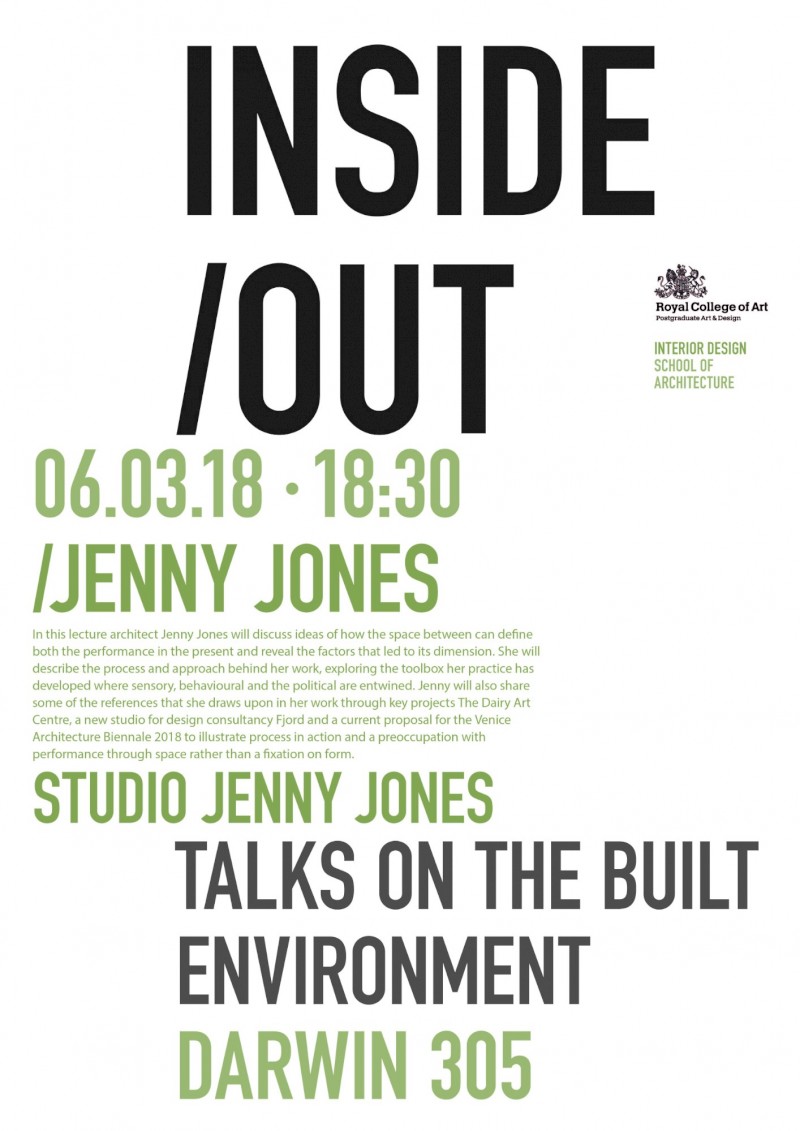
In this lecture architect Jenny Jones will discuss ideas of how the space between can define both the performance in the present and reveal the factors that led to its dimension. She will describe the process and approach behind her work, exploring the toolbox her practice has developed where sensory, behavioural and the political are entwined. Jenny will also share some of the references that she draws upon in her work through key projects The Dairy Art Centre, a new studio for design consultancy Fjord and a current proposal for the Venice Architecture Biennale 2018 to illustrate process in action and a preoccupation with performance through space rather than a fixation on form.
<more>
11/10/17
Prop-tech Tallk at Soon HQ | How can we merge the visceral and virtual?
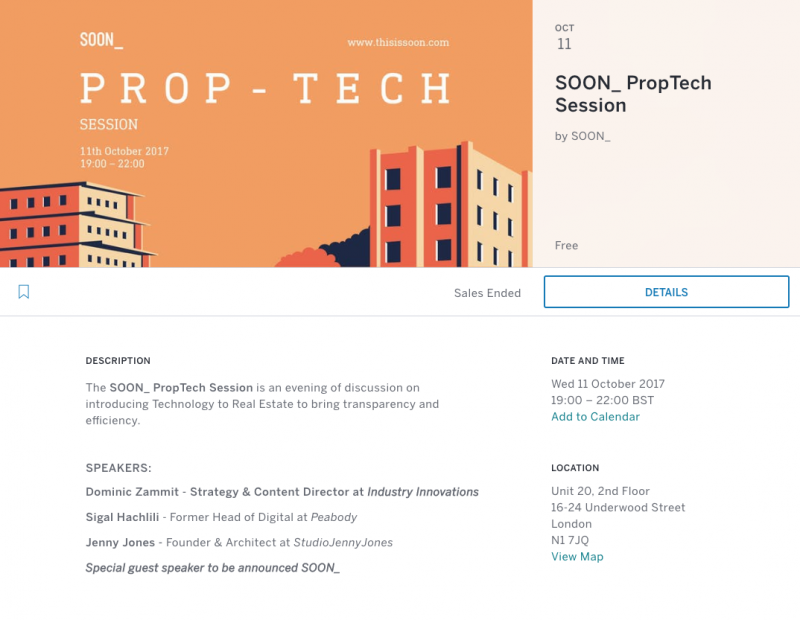
Jenny Jones will be one of 4 speakers at the Soon HQ. Talking about Prop-tech. Her angle coming from how can we merge the visceral and virtual?
<click through to book tickets at Eventbrite. It's free!>
<more>
